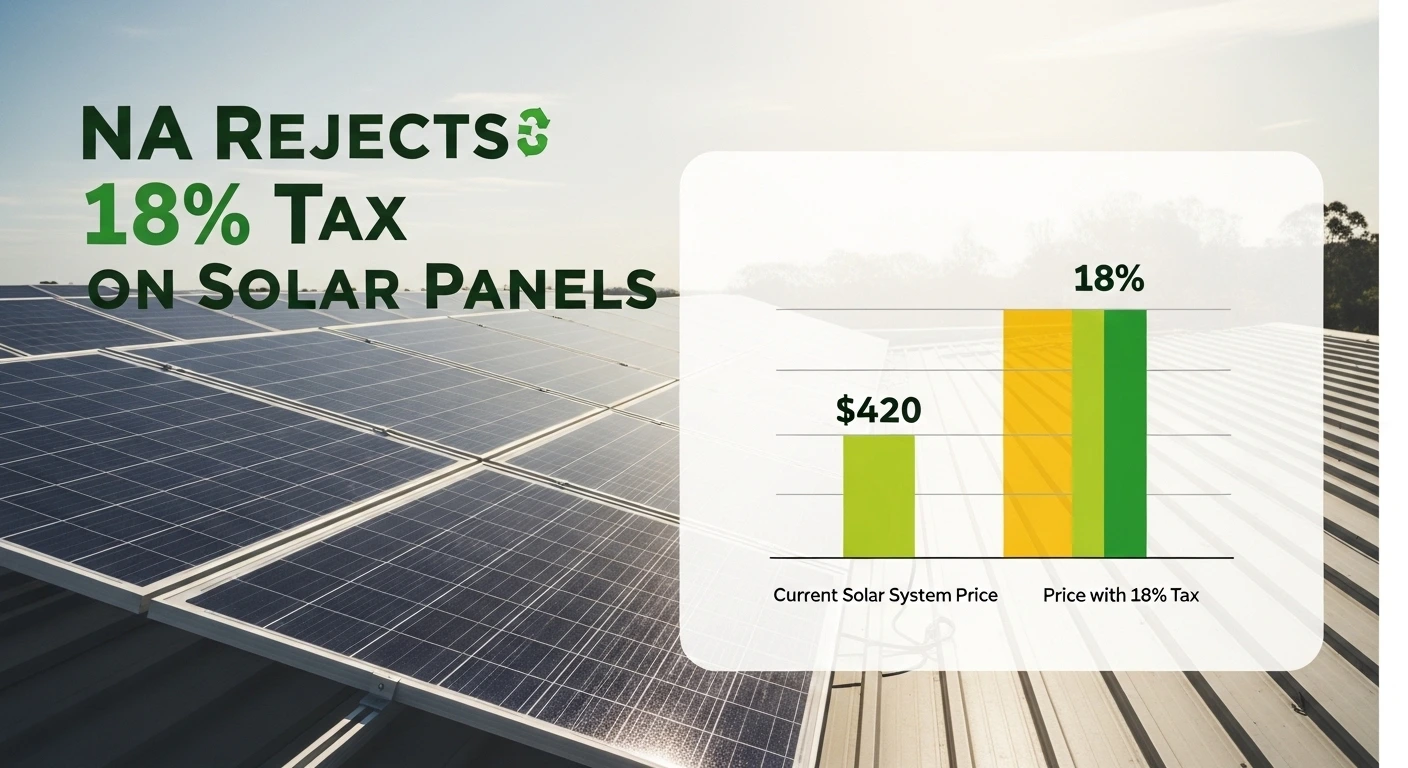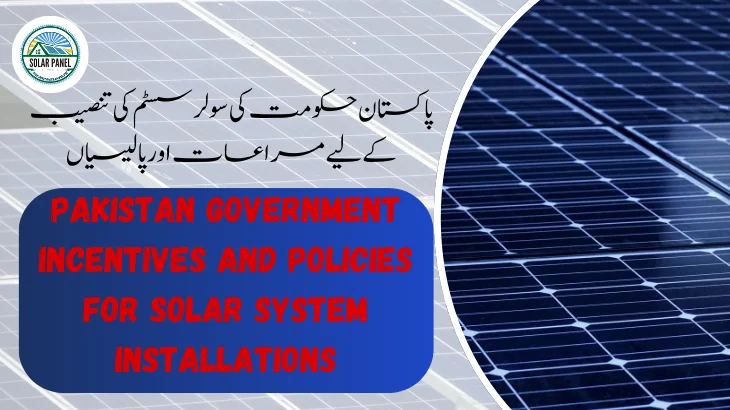NA Rejects 18% Tax on Solar Panels
The National Assembly’s Standing Committee on Finance in Pakistan has rejected a proposal to impose an 18% sales tax on solar panels during the budget discussions for the fiscal year 2026-27. This decision follows concerns from families, solar companies, and climate advocates about the potentially negative impact of such a tax on the affordability of solar energy and the country’s transition to sustainable energy. Here we will discuss the NA Rejects 18% Tax on Solar Panels.
Read more: Solar Panel Prices May Rise as an 18% Tax is Proposed

پاکستان میں قومی اسمبلی کی قائمہ کمیٹی برائے خزانہ نے مالی سال 2026-27 کے بجٹ پر بحث کے دوران سولر پینلز پر 18 فیصد سیلز ٹیکس عائد کرنے کی تجویز کو مسترد کر دیا ہے۔ یہ فیصلہ خاندانوں، شمسی کمپنیوں اور آب و ہوا کے حامیوں کی جانب سے شمسی توانائی کی استطاعت اور ملک کی پائیدار توانائی کی منتقلی پر اس طرح کے ٹیکس کے ممکنہ منفی اثرات کے بارے میں خدشات کے بعد کیا گیا ہے۔
Why the Government proposed an 18% tax on solar panels
In the preliminary 2025-26 federal budget draft, the Finance Ministry proposed imposing an 18% sales tax on all imported solar panels. Officials claimed it was necessary to raise revenue and regulate the sector.
A Win for Renewable Energy Advocates
Members of the committee highlighted the significance of promoting solar energy use in both urban and rural settings, especially in a nation grappling with persistent energy deficits and increasing fuel prices. “Imposing taxes on solar panels at this point would have been counterproductive,” stated MNA Ayesha Gul, a committee member. “We need to provide incentives for renewable energy, rather than complicating access for individuals.” Presently, Pakistan relies heavily on imported solar panels and related technologies, and the industry has seen swift expansion in recent years. With continuous power outages and rising electricity costs, numerous businesses and homeowners have turned to solar energy as a dependable and economical option.
NA committee rejects tax proposal – what happened
After several heated discussions in Parliament, the NA committee officially rejected the 18% GST proposal on solar panels. According to sources, the committee stressed that taxing solar panels would hurt economic growth, burden ordinary citizens, and delay Pakistan’s shift to renewable energy.
Impact of solar panel prices in Pakistan
If the 18% tax on solar panels had been approved, the price of a common solar system would have increased drastically. Currently, the average price of a 5kW system is between PKR 650,000 and PKR 900,000, depending on the type and brand of panels.
| System Size | Current Price (PKR) | Price with 18% Tax (PKR) | Notes / Typical Range (2026) |
|---|---|---|---|
| 3kW | 330,000 – 550,000 | 390,000 – 650,000 | Hybrid/on-grid; lower end basic, higher for premium brands. Some quotes ~PKR 450,000–550,000 base. |
| 5kW | 650,000 – 900,000 | 770,000 – 1,062,000 | Common for medium homes; ranges from PKR 650k–700k (basic) to higher with better components. |
| 10kW | 890,000 – 1,800,000 | 1,050,000 – 2,124,000 | For larger homes/shops; many quotes around PKR 890k–950k base, up to 1.5M+ for full setups. |
Read more: 5KW Solar System Price In Pakistan
Public Pressure and Industry Reaction
The proposal for an 18% tax on solar systems sparked protests from solar importers, engineers, and environmental groups, leading to an online petition that gathered tens of thousands of signatures in opposition. Imran Latif, spokesperson for the Pakistan Solar Association, emphasized that the tax would have significantly increased costs, hindered solar adoption, and negatively impacted the industry during a crucial time for energy independence.
What does this mean for Renewable Energy in Pakistan
Pakistan’s energy crisis is getting worse with each passing year. Frequent power outages, rising electricity costs, and heavy dependence on imported oil remain serious challenges. However, solar energy offers a promising solution. More and more homes and businesses are turning to solar panels for reliable and eco-friendly electricity.
Will the government try to 18% tax on solar panels again?
Although the 18% tax has been rejected for now, that doesn’t mean it won’t come back later. In the past, similar proposals have come back during mid-year budget adjustments or under different headings. To collect revenue from the growing solar market in the future, the government may consider “value-added services” or levy small charges.
Government’s Position and the Road Ahead
The Ministry of Finance is reconsidering ways to improve the country’s fiscal position without compromising green energy initiatives, following the rejection of a proposed tax aimed at boosting revenue during IMF negotiations. Analysts note this reflects a growing awareness in parliament for long-term energy planning, but the solar sector continues to face challenges such as inconsistent regulations, quality control issues, and limited financing options for low-income households.
Conclusion
The Finance Committee of the National Assembly’s decision to reject the suggested 18% sales tax on solar panels is a crucial advancement in supporting Pakistan’s renewable energy future. This action not only shields consumers from increasing solar prices but also reinforces the government’s dedication to sustainable development. Nevertheless, in light of ongoing financial challenges, the solar sector must stay alert, as similar proposals might arise again. Ensuring long-term policy consistency, affordability, and collaboration between the public and private sectors is vital for expediting Pakistan’s shift to clean, independent energy.
قومی اسمبلی کی فنانس کمیٹی کا سولر پینلز پر 18 فیصد سیلز ٹیکس کو مسترد کرنے کا فیصلہ پاکستان کے قابل تجدید توانائی کے مستقبل کی حمایت میں ایک اہم پیشرفت ہے۔ یہ اقدام نہ صرف صارفین کو شمسی توانائی کی قیمتوں میں اضافے سے بچاتا ہے بلکہ پائیدار ترقی کے لیے حکومت کی لگن کو بھی تقویت دیتا ہے۔ بہر حال، جاری مالیاتی چیلنجوں کی روشنی میں، سولر سیکٹر کو چوکنا رہنا چاہیے، کیونکہ ایسی ہی تجاویز دوبارہ سامنے آسکتی ہیں۔ پاکستان کی صاف، خودمختار توانائی کی طرف منتقلی کو تیز کرنے کے لیے عوامی اور نجی شعبوں کے درمیان طویل مدتی پالیسی کی مستقل مزاجی، استطاعت اور تعاون کو یقینی بنانا ناگزیر ہے۔
FAQ’s
Why was the 18% tax on solar panels proposed in the first place?
The proposal aimed to enhance government revenue while also regulating the expanding solar energy sector.
How would the tax have affected solar panel prices in Pakistan?
>The tax would have significantly increased the cost of solar systems—up to PKR 200,000 more for a 3kW system—making them less affordable for many households.
Is the threat of taxation on solar panels over?
No, although the current proposal was rejected, similar taxes may arise under different names or during future budget sessions.


